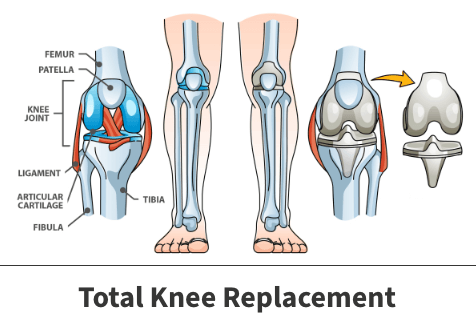Total knee replacement
After the first total knee replacement surgery was performed in 1968, knee replacement surgery has continually evolved in its usefulness, effectiveness, and overall success. Developments in surgical practices, coupled with innovative technologies, make the replacement of your total knee one of the most successful surgeries. Knee replacement procedures continue to grow, year over year, with almost a million successful replacements every year in the United States alone.
Total knee replacement surgery is a procedure that replaces the painful joint in your knee with space-age materials designed especially for your knee.
If you’re searching for medical information about, as well as expert care for, a knee replacement, look no further. Florida Orthopaedic Institute’s fellowship-trained surgeons are renowned specialists in this field. We hope you find this information helpful in further understanding what a total knee replacement involves.
Anatomy

The knee is a hinge joint, meaning it can only bend in one direction. It is where the tibia, the femur, and the patella meet. Like most joints in the body, the knee joint is lined with articular cartilage. The articular cartilage acts as a shock absorber and allows smooth and stable movement. When the articular cartilage wears away, knee replacement can alleviate pain and restore both movement and function.
Treatment
This procedure restores function to a severely damaged knee. Most commonly, it is used to repair a knee that has been damaged by arthritis.
Total knee surgery removes the damaged and painful areas of the femur (the thigh bone) and tibia (the lower leg bone).
During the procedure, the surgeon replaces the damaged portions of the knee with artificial parts. These parts typically consist of specially-designed metal femoral and tibial components and a plastic (polyethylene) spacer. A small plastic patellar component may also be used.
Some surgeons plan and perform the surgery with the aid of robotic instruments and a computer guidance system.
Diagnostic tests that may be used for total knee surgery
- X-rays
- Magnetic Resonance Imaging (MRI)
- Computed Tomography (CT) scans

Videos
Related specialties
- ACL Injuries
- Arthroscopic Chondroplasty
- Articular Cartilage Restoration
- Deep Thigh Bruising
- Fractures of the Tibial Spine
- Iliotibial Band Syndrome
- Lateral Collateral Ligament (LCL) Injuries
- MACI
- Medial Collateral Ligament Injuries
- Meniscus Tears
- Muscle Spasms
- Muscle Strains of the Calf
- Partial Knee Replacement
- Patellar Fracture
- Quadriceps Tendon Tear
- Runner's Knee
- Senior Strong
- Shin Splints
